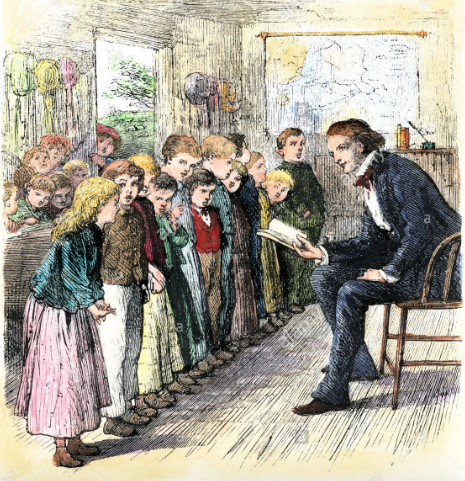
Recitations are kind of the lost and forgotten gem of classical education. Many classical educators still conduct recitations but for most modern educators it is an unheard concept. I for sure did not grow up in the public school system ever having to recite anything. We had tests. And lots of them.
So What Are Recitations?
Simply speaking, a recitation is the act of repeating something aloud from memory. But practically speaking, there are three great benefits from recitation:
- Recitation for learning
- Recitation for demonstrating mastery to the teacher
- Recitation for enjoyment, building confidence, and storing treasures in your heart
Reciting to Learn
We use recitation for learning daily in our homeschool and also in our cottage school. Saying facts of knowledge together can be very helpful because a cadence or rhythm gets built in that sticks with them when they recite alone. Before we start a latin lesson we will always say our forms. Most days at home the older children will recite independently, but as the situation calls for it sometimes they need to come and recite to me.
Reciting is a way to keep information fresh in one’s memory and work through any rough spots. There are many subjects we all do that require mastery. I always know what went wrong when the kids find math or latin difficult. The problem is always they have forgotten what they learned before (or perhaps never really learned). It’s usually not because the new subject matter is difficult, but because they forgot something they already learned. Recitation provides a method for memorizing. It is a daily refresher.
Recitation to Demonstrate Mastery
We also use recitations to demonstrate mastery over the material. Forget matching, multiple choice, or fill-in the blanks–this is far simpler. It is fastest quiz or the most productive test you will ever administer. I even use it as a daily “check”. Rather than have the children tell you they completed an assignment how much better it they demonstrate it! Simply have them recite what they were supposed to learn during that lesson.
For instance, let’s say the lesson is to learn the state and its capital and a few important facts. The intention of this assignment is that they will eventually have them learn all 50 state by heart. How often do children complete an assignment and forget it! If you want something to stick, have them commit it to memory knowing they will be reciting to you. When the children are younger this requires assistance. With patience and diligence, you have to teach them how to memorize. But as they get older and are independent readers and acquainted with the skill of memorizing, it will take only a matter of moments. Once they complete the lesson page, I may require them to commit it to mastery and, when they are ready, to come to me and recite the most important facts of what they have learned. Then the lesson will actually be “completed” and they can move on to the next subject.
It also works well as a cumulative test. For latin, have them recite to you all the forms they just learned as well as pick a handful of latin vocabulary for them to translate to you in English. Recitation is the truest demonstration of mastery.
“If you want a child to really know –truly own–a body of information, recitation is the only way to go. Previously the sole method of testing, recitation requires mastery of a subject like no other testing mechanism can. With nowhere to hide and no opportunity for charms or tricks, it requires the student focus, poise, and absolute certainty of the information presented. Beyond providing an objective demonstration of knowledge acquired, recitation fosters confidence – the kind earned by accomplishing a challenging feat, the kind that enables a student to humbly believe he can learn anything. This is an invaluable benefit of conducting regular recitations.”
– Memoria Press Curriculum Guides, pg 4
Up until the last one hundred years recitation was how everyone was tested. The children only moved up to the next level when they demonstrated they had learned the information. Recitation even today is still one of the best ways to demonstrate knowledge.
Illinois State University conducted research on one-room schoolhouses and interviewed many of the last few living teachers that remembered how things were. Ruth Ryder, 96 years old (in 2014) taught in a small rural school in 1939 and she conducted recitations as a means of testing. “She had no problem keeping order in the classroom, as the students had seatwork when other grades were being taught, and they knew her rules of behavior. ‘I directed each group of students with the order, ‘Turn, Rise, Pass.’ They would turn from their desks, rise, and proceed to the recitation bench, books in hand.’
Most students benefited from hearing the upper grade lessons recite and they were diligent, as they knew test day was coming. In those days, vigorous quarterly exams were the only way you could pass. “Quarterly exam questions were written by the county superintendent and sent by mail to the teacher,” Ryder recalled. “Of greatest importance were the seventh and eighth grade exams. These were county-wide exams, given on a Saturday at the county seat, and students were required to pass them before progressing to the next grade.” An intense review was provided for the students, as a rural teacher’s future depended on the student exam performance. “One of my directors would not confirm my contract would be extended for a second year until after he saw the county exam results,” Ryder remembered. She wonders if students today could pass the tests. They were so rigorous, it was not unusual for many students to end their education at the eighth grade.
Roy Schilling, who will be 100 (in 2014) also taught a small rural one-room school house in 1935. He remembers how students would eagerly listen to the work of the other grades, allowing them to get a solid seven years of education. “I taught 32 classes a day,” Schilling recalled. “Keenly aware that education resulted from the process of teaching and learning, I felt a heavy responsibility as I planned and listened to more than 30 daily recitations.” And surprisingly the work was done without much interruption from misbehavior. “Good discipline was assumed to be the chief order of the day by children and parents, as well as by the teacher.”
A man who attended a rural school in 1936 in the Chicago area remembered his childhood with his mother as the teacher of the school, “My first grade was in the Grant School, a classic one-room very rural school…There were around twenty students, except when it rained hard and Otter Creek flooded – then only seven could make it. As I recall, the education that the students got from that environment was every bit as good, if not better, than the consolidated schools that came later. Of course, that might have meant that Mom was a good teacher – strict, I’ll tell ya, but good. I vaguely recall that she tended to aim her teaching not completely at a certain grade level, but instead at the ability of the individual student.”
And that is the beauty of recitations, you as the teacher decide what ought to be recited. When I do oral vocab drills with my children, I choose the words I know to be a challenge to them but not too challenging. If I have a struggling student, I can frame my recitations around their needs. Tests from the textbook do not afford this kind of flexibility.
You will also find it a time saver and for that reason my children vastly prefer reciting to paper tests. There is still a time and place for paper tests but don’t miss out on the many benefits of regular recitations – for learning new material and for demonstrating mastery. Your students will be quicker at all their subject matter and things will come easier because of the intentionality of memorizing the necessary parts of what they are learning.
Reciting What is Beautiful
And lastly, we memorize and recite for beauty. We memorize Scripture to hide God’s Word in our hearts and we recite it to share His truth with others and to remind ourselves of His Goodness. We memorize beautiful poetry and recite it to others for their enjoyment and benefit. I had my son memorize the poem “If” by Rudyard Kipling, knowing that he would have those wise words with him always as he grew to be a man. And even more importantly, they memorize Scripture on a weekly basis. I can think of all the dumb radio songs I memorized growing up but never any scripture. I still know all those dumb songs today! And they are of know use to me (except maybe on a karaoke night!) But how wonderful that our children are memorizing God’s own Word! And it will be with them all their life long.
Also, as our children recite poetry, plays, Scripture and otherwise, it builds confidence. The children get their first taste of public speaking in a loving caring environment as they recite to mom or dad or Grandma and Grandpa. In our cottage school, during recitation time, I allow students to recite the poetry they have been learning in the Memoria Press Poetry curriculum. It is a source of blessing and enjoyment to its hearers and a confidence builder to the speaker.
I highly recommend making these kinds of fun recitations of beautiful works a part of your school routine. Make it a regular part of school that the children are always working on memorizing 2-3 beautiful works. If you only have time for one, let it be Scripture. But if you have time for a second, find some beautiful poems that have stood the test of time and convey wisdom and truth. Only once, in all of my school years, was I ever told to memorize and recite anything like this. In 8th grade we all had to memorize a poem and stand up in class and recite it. To this day, I have never forgotten my poem. “Stopping by the Woods on a Snowing Evening” by Robert Frost. Songs and poetry have a way of sticking with us for life.
Do you conduct recitations in your homeschool? What kinds of things do you recite? Share in the comments below!
Helpful Resources:
- Poetry for the Grammar Age
- Poetry & Short Stories: American Literature (for 7th+)
- Poetry, Prose, & Drama Book One: The Old English & Medieval Periods (8th+)
- The British Tradition II: Poetry & Prose from the Elizabethan to the Neoclassical Age (1485-1784 A.D.) (8th+)
- Poetry Book Three: The Romantic to the Victorian Age (8th+)
- Latin Grammar Recitation Set and/or recitation DVD/CD
- English Grammar Recitation Book and Flashcards
- Christian Studies Curriculum (Children memorize Bible Verses each week)
